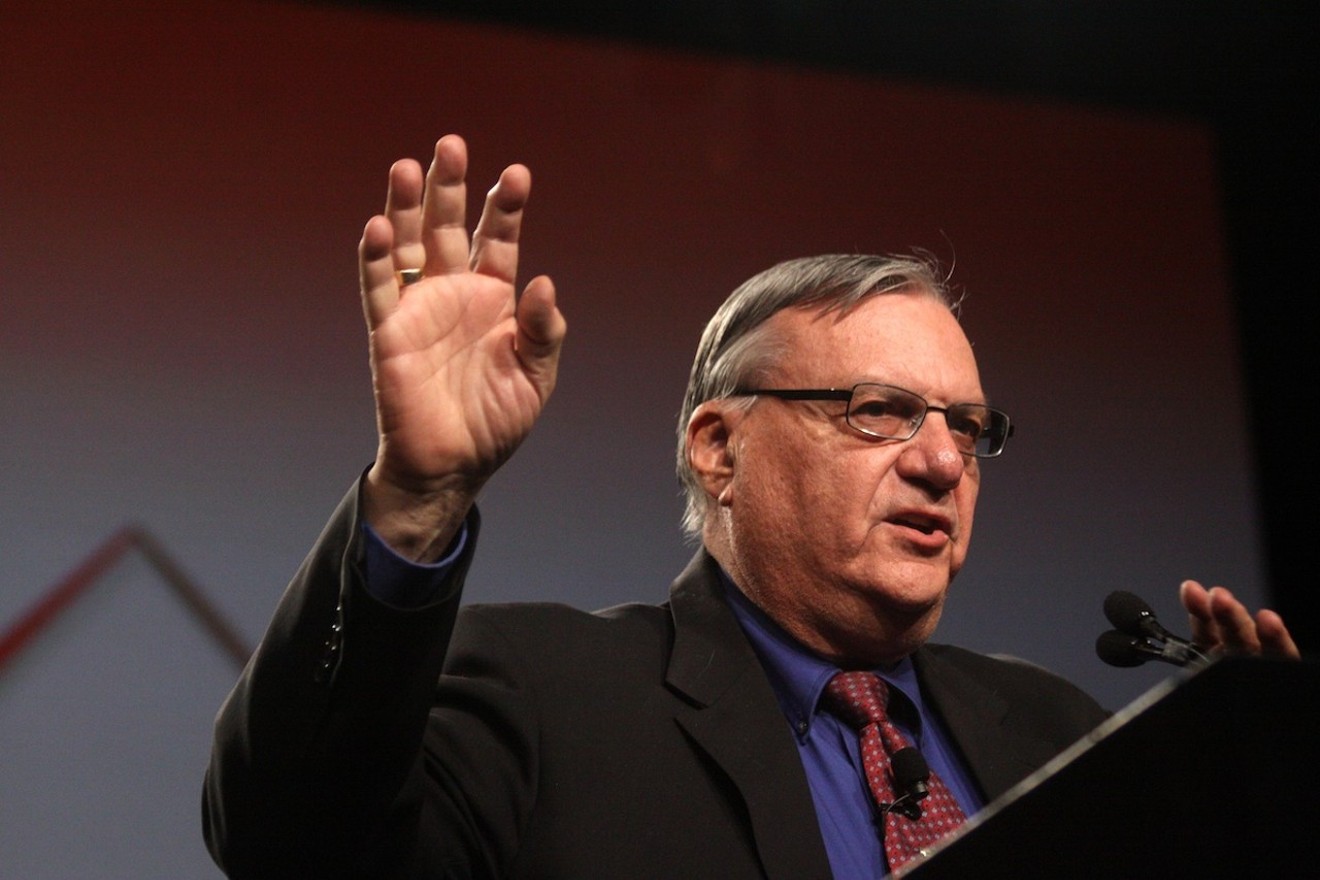A film producer behind major films including "John Wick" and "Frontera" is making a documentary series on the life of Joe Arpaio, the divisive former Maricopa County Sheriff gunning for his old job in this year's election. Arpaio is to be paid for his involvement — a move that raises questions with some in the documentary film industry.
Mike Witherill, the Arizona-based CEO of Rivulet Films, told Phoenix New Times that the docuseries is currently in production and that, if they can get a distribution deal for the project, Arpaio will receive $10,000 as a "consulting fee."
"I intend to pay him the ten grand," he said. "We’ll be finished with production ideally in the next week or two. We’re editing as we go... We’re in talks with a number of distributors who have expressed interest in the project."
As Witherill tells it, the series will be a four-part "straight documentary" that takes a critical look at the entire life of Arpaio, interviewing both his detractors and supporters.
"There aren’t that many law enforcement people in the country that are as well recognized as him. There are people that are vastly opposed [to] what he did or didn’t do," he said. "Everyone has heard [of] Joe Arpaio, toughest sheriff in America. We’re trying to do something different: Who is the guy behind that whole persona, trying to do all kinds of things, how he was raised and his upbringing."
In a recent press release announcing the project, Aaron Klusman, CEO of Rivulet Films' parent company, Rivulet Media, described Arpaio's story as a cross between two well-known Netflix series: "If 'tiger king' and 'narcos' had a baby... Sheriffs [sic] Joe['s] story would probably be it."
Arpaio did not respond to New Times' requests for comment on the project and his involvement.
Witherill has his work cut out for him. Arpaio's career as sheriff spanned more than two decades, from 1993 to 2016, with controversies including the mistreatment of jailed suspects, millions lost in misspending and legal payouts, and discrimination against Latinos that led to one of the most significant civil-rights actions the federal government has ever undertaken against a local law enforcement agency. In 2017, Arpaio was pardoned by President Trump for a criminal contempt of court conviction.
Originally, Witherill said that he was thinking of doing a dramatized television series about Arpaio's life, where they'd hire actors to play him and other characters while taking creative liberties with his story. The idea for the project first came from Jack Wilenchik, a local attorney who has represented Arpaio in the past.
"I know them both and I connected them both," Wilenchik told New Times. "Mike’s a film producer and Arpaio is a well-known subject of documentaries and films. It seemed like an obvious connection."
"I thought it would be interesting from the standpoint of doing a TV show," Witherill said. "The more I looked at it... and how strongly feel about Joe, it made sense for me to do it more as a docuseries rather than taking liberties with the story."
But even this new angle has raised the eyebrows of some critics of the project, due to the fact that Arpaio stands to get paid from the project and it's an election year.
"It completely undermines the credibility of the project," Simon Kilmurry, executive director of the Los Angeles-based International Documentary Association, told New Times. "Because, who has editorial control? You can’t call it a documentary, which is a cousin of journalism and part of the journalistic family — you can’t give a subject like that editorial control over the topic. It’s a conflict of interest. It’s just too stark a conflict of interest."
"To have an agreement, particularly with someone as controversial as Arpaio, to be compensated in a documentary about himself ... is really unheard of and quite disturbing," he added. "It is a worrying trend when we begin to see these edges blurred around what is ethical within the field."
The project has already made its way into the political realm. An email sent from Maricopa County Sheriff Paul Penzone's reelection campaign on June 11 used the docuseries on Arpaio as a foil to solicit campaign contributions.
"From selling pink underwear as a relic of the infamous 'Tent City' prison to bragging about his presidential pardon, Arpaio has proven time and time again his priority is himself — not serving the people of Maricopa County," the email states. "And now, his latest venture makes it clearer than ever: Last week, Arpaio began filming a documentary series on his tenure as sheriff... one that will surely gloss over the many crimes, controversies, and abuse of taxpayer dollars that characterized his career."
Per the original agreement between the production company and Arpaio — which Witherill said was drafted when they were preparing to make a dramatized series — Arpaio was going to be paid $20,000 for every 30 minutes of the production, on top of the $10,000 "consulting fee." But Witherill said that part of the contract has been scratched because they are now pursuing a documentary series and not a dramatized series. He strongly disputed the notion that the project's editorial integrity is compromised because Arpaio, the primary subject of the series, is expected to get paid.
"If we were doing an episodic TV series with an actor playing his likeness, then he would be entitled to compensation on a per-episode basis," Witherill said. "It has nothing to do with the story, and to imply that there’s some ethical issue with that is nonsensical."
That same agreement also includes language giving Arpaio some degree of editorial oversight of the project. Specifically, under the agreement, Arpaio would be allowed to "review and be consulted on final scripts of the Motion Pictures produced," though the producer has final authority, per the contract. Additionally, per the agreement, the producer is allowed to make "changes to the Life Story, to create fictional episodes, characters and/or dialogue for dramatic purposes," as well as "reasonably deviate from the facts of the Life Story in order to enhance the dramatic value."
Witherill argues that all of this language was drafted under the assumption that they were going to make a dramatized television series, and that they don't intend to manipulate the facts in the docuseries or create a pro-Arpaio propaganda piece.
"In film, whether it’s a feature film, a TV series, a mini-series, you have as broad of language in there as you can. As we first set out to do this, it was under the guise of 'look we would hire an actor and create an episodic TV deal'," he said. "If I pay Joe Arpaio ten grand and I have final say on the movie, how is that going to influence me?"
Connie Mableson, a local copyright and entertainment attorney, tells New Times that the agreement is pretty standard for the entertainment movie business, where producers are unsure of where they'll take a project.
"A lot of times these guys don’t know where they’re going to go. They don’t know if it will be cable or Netflix or just a hour-and-a-half film or mini episodes," she said, referring to the language concerning creative liberties and compensation. "The producers have to get together and figure out if it has legs."
However, Mableson added that, based on her reading of the agreement, it doesn't give the producers room to avoid paying Arpaio the $20,000 per 30 minutes of content based on the fact that they're doing a documentary versus a dramatized series.
"My take is that it’s not format-related," she said. "It’s guaranteed compensation."
The agreement on its face was worrisome for John Dougherty, a freelance investigative journalist and former New Times reporter who covered Arpaio extensively in the '90s. He told New Times that about a week ago, he was contacted by Witherill, who requested an interview. Dougherty was told that the production company was doing a documentary, but some quick internet sleuthing turned up the agreement between the production company and Arpaio, and he got spooked. He ultimately declined the interview.
"Arpaio stands to make money from this. That was really, to me, the breaking point. A documentary doesn’t mean that the subject of the documentary is going to get paid," Dougherty said. "I’m not doing anything that helps that guy financially. Zero... This is a Hollywoodized, bastardized version of a docudrama."
Witherill declined to immediately provide the names of other sources that his team is interviewing for the series. He also denied that the project has any association with, or funding from, Arpaio's reelection campaign: "Rivulet is financing the entire project at this point," he said.
On the question of whether Arpaio will be able to review footage, Witherill said that "anybody that we interview will likely see the final version," though any feedback they have won't lead to editorial changes.
"If you think we’re not asking Joe really really challenging questions, you’re wrong because we are," he added. "I’m not going to be influenced by somebody saying 'don’t put that in there because it doesn’t make me look good.'"
We've embedded a copy of the agreement between Rivulet Media and Arpaio below.
[
{
"name": "Air - MediumRectangle - Inline Content - Mobile Display Size",
"component": "18478561",
"insertPoint": "2",
"requiredCountToDisplay": "2"
},{
"name": "Editor Picks",
"component": "16759093",
"insertPoint": "4",
"requiredCountToDisplay": "1"
},{
"name": "Inline Links",
"component": "17980324",
"insertPoint": "8th",
"startingPoint": 8,
"requiredCountToDisplay": "7",
"maxInsertions": 25
},{
"name": "Air - MediumRectangle - Combo - Inline Content",
"component": "16759092",
"insertPoint": "8th",
"startingPoint": 8,
"requiredCountToDisplay": "7",
"maxInsertions": 25
},{
"name": "Inline Links",
"component": "17980324",
"insertPoint": "8th",
"startingPoint": 12,
"requiredCountToDisplay": "11",
"maxInsertions": 24
},{
"name": "Air - Leaderboard Tower - Combo - Inline Content",
"component": "16759094",
"insertPoint": "8th",
"startingPoint": 12,
"requiredCountToDisplay": "11",
"maxInsertions": 24
}
]












